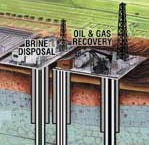California officials ordered an emergency shutdown of 11 oil and gas waste injection sites in Kern County earlier this month, fearing they may be contaminating sources of drinking water that are sorely needed in the drought-stricken state.
No contamination has actually been found in any drinking or irrigation water, but, according to The Bakersfield Californian, “Pollution has not been ruled out… as regulators conduct site inspections and await test results and other information from the companies” that were operating the injection sites.
State officials are reviewing not just the 11 wells that were ordered to be shut down but as many as 100 more in northeast and east Bakersfield, CA over fears that fracking fluids and “produced waters” (the toxic and potentially radioactive fluids that come up with oil) may be leeching into potential sources of potable water.
As ProPublica reported, California’s Division of Oil and Gas and Geothermal Resources issued the shutdown orders on July 7 to seven different energy companies, saying that they may have injected wastewater into aquifers that could be a source of drinking water, which “poses danger to life, health, property, and natural resources.”
A review of wastewater injections sites is long overdue in California. The state had exempted as many as 100 aquifers from environmental protection after they were found to contain water unfit for consumption or to be too deep to make their use feasible. But a 2011 report released by the U.S. Environmental Protection Agency found significant shortcomings with how the state was managing its wastewater injection program:
Among the issues, California and the federal government disagree about what type of water is worth protecting in the first place, with California law only protecting a fraction of the waters that the federal Safe Drinking Water Act requires.
The EPA‘s report, commissioned from outside consultants, also said that California regulators routinely failed to adequately examine the geology around an injection well to ensure that fluids pumped into it would not leak underground and contaminate drinking water aquifers. The report found that state inspectors often allowed injection at pressures that exceeded the capabilities of the wells and thus risked cracking the surrounding rock and spreading contaminants. Several accidents in recent years in California involved injected waste or injected steam leaking back out of abandoned wells, or blowing out of the ground and creating sinkholes, including one 2011 incident that killed an oil worker.
The state of California has yet to fully address these findings, but the shutdown order and impending review may be a start.
Some of those aquifers previously written off by California regulators are now regarded as potentially viable sources of potable water, due to changes in our climate and new technologies.
But California’s oversight has been so lax, the state doesn’t even have precise information on the boundaries of the bodies of water in question. Aquifers were “often identified by hand-drawn lines on a map,” according to ProPublica, “making it difficult to know today exactly which bodies of water were supposed to be protected, and by which aspects of the governing laws.”
Though no contamination has yet been found, ProPublica points out: “according to the cease and desist orders issued by the state, it appears that at least seven injection wells are likely pumping waste into fresh water aquifers protected by the law, and not other aquifers sacrificed by the state long ago.”
Image credit: EPA.
Subscribe to our newsletter
Stay up to date with DeSmog news and alerts







